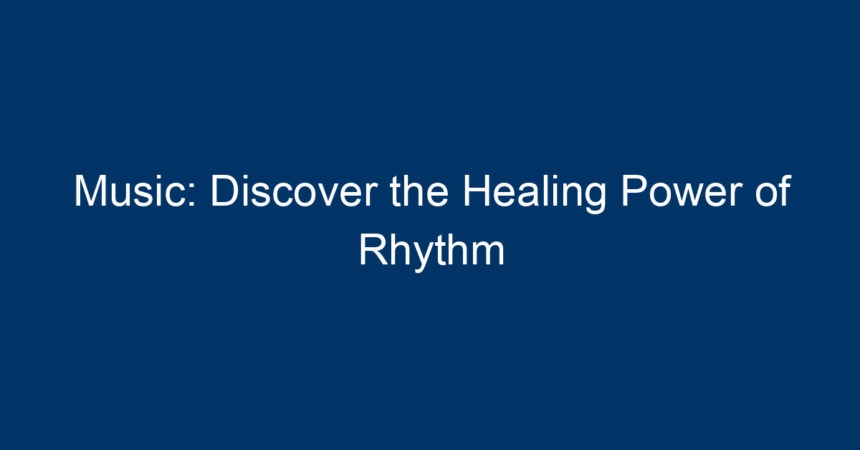Introduction
In a world filled with chaos and stress, the healing power of music stands as a beacon of hope, inviting us to experience wellness in a unique and profound way. Music can transcend language and cultural barriers, connecting individuals on an emotional level. It is not just entertainment; it is a therapeutic tool that has been used for centuries to enhance well-being. In this engaging article, we will explore how music can heal the mind and body, the science behind its therapeutic effects, and actionable insights on how to integrate music into your daily life for optimal wellness.
The Science Behind Music and Healing
How Music Affects the Brain
Research has shown that music impacts the brain in various ways, stimulating areas responsible for emotion, memory, and even motor skills. When we listen to music, our brain releases neurotransmitters such as dopamine, which contribute to feelings of pleasure. This biochemical response can elevate mood and help to reduce anxiety. Understanding these processes highlights how music is not merely an art form but an essential aspect of mental health.
The Power of Rhythm
Rhythm is a universal language; it exists in nature as seen in heartbeat patterns and the cycle of seasons. Studies indicate that rhythmic music can synchronize brainwave activity, enhancing focus and relaxation. This synchronization can improve various cognitive functions, making rhythm a key player in the healing power of music.
Music Therapy: A Gentle Yet Effective Approach
Music therapy involves the use of music interventions to accomplish individualized goals within a therapeutic relationship. Licensed music therapists utilize music to address physical, emotional, cognitive, and social needs of individuals. The versatility of music therapy means it can be adapted to a variety of conditions, including:
- Mental Health Disorders: From depression to PTSD, music can serve as a non-invasive medium for expression and healing.
- Chronic Pain Management: Listening to soothing music can reduce the perception of pain, making it an effective adjunct to traditional pain management strategies.
- Neurological Disorders: Conditions like Alzheimer’s disease or stroke recovery can benefit from music therapy to regain lost communication skills and emotional expression.
The Emotional Impact of Music
Music as an Emotional Outlet
One of the most immediate benefits of music is its ability to evoke emotion. Whether you’re feeling joyful, sad, or anxious, there’s likely a song that resonates with your current state. The emotional outlet music provides can offer solace during tough times. For instance:
- Anger Manager: Heavy metal or fast-paced genres can serve as a cathartic release for anger.
- Mellow Moments: Soft acoustic or classical tunes can help soothe racing thoughts and promote calmness.
Music and Memory
Music’s intricate link to memory is particularly noteworthy. The brain’s ability to connect memories with musical patterns enables individuals to recall emotions and experiences tied to a specific song. This feature is especially beneficial for those dealing with memory-related disorders. Creating personalized playlists can be a therapeutic tool, enabling individuals to relive positive moments and emotions.
Finding Your Rhythm: Practical Tips for Incorporating Music into Daily Life
Create Personalized Playlists
One of the easiest ways to incorporate the healing power of music into your life is by curating personalized playlists. Tailoring your music selection to different moods can ensure that you have the right soundtrack for any situation:
- Morning Uplift: Start your day with energizing tunes that set a positive tone.
- Work Focus: Play instrumental or ambient music to enhance concentration while working on tasks.
- Relaxation: Wind down at the end of the day with soft tunes that promote peace and clarity.
Embrace Musical Activities
Engaging in musical activities can deepen the therapeutic benefits of music. Here are a few ideas to consider:
- Play an Instrument: Learning to play an instrument can enhance cognitive function and promote emotional expression. It doesn’t necessarily require formal lessons; online tutorials make learning accessible to everyone.
- Join a Choir or Band: Participating in group music activities not only boosts your mood but also fosters a sense of community, which is essential for mental health.
Explore Different Genres
Don’t limit yourself to one genre; explore a wide array of musical styles. Different forms of music can evoke different responses in your mind and body. Whether it’s jazz, classical, hip-hop, or world music, every genre has something unique to offer.
Use Music as a Mindfulness Tool
Incorporating music into your mindfulness practice can enhance its benefits. Listen to calming sounds or soft instrumental music while practicing meditation or yoga. This combination can deepen relaxation and improve focus, enabling you to connect more profoundly with your internal state.
Music and Physical Wellness
Enhancing Physical Activity
Music has been shown to motivate individuals to participate in physical activities. It can enhance endurance during workouts, making the experience more enjoyable.
- Exercise Motivation: Upbeat music can serve as a motivational force during cardiovascular workouts or strength training, helping you push through your limits.
Music for Healing and Recovery
In medical settings, music is often used to aid in recovery. Listening to music can help reduce anxiety and pain before, during, and after medical procedures. Hospitals are increasingly recognizing the benefits of creating a calming environment with soothing background music.
The Cultural Significance of Music
Music and Community
Music has always been a communal experience, bringing people together from diverse backgrounds. Cultural songs, dances, and rituals play an essential role in enhancing social bonds.
- Cultural Events: Attend concerts, festivals, or cultural gatherings to experience the uniting power of music firsthand. Participating in these events can contribute to a sense of belonging and emotional well-being.
Incorporating Music into Life’s Milestones
From weddings to funerals, music plays a fundamental role in marking significant life events. This highlights how integral music is to human experiences, enhancing emotional responses and creating lasting memories.
Conclusion
The healing power of music is multifaceted, offering benefits that range from emotional and psychological support to enhanced physical well-being. By understanding the science behind music and incorporating it into your daily life, you can harness its transformative effects for your overall wellness.
Actionable Insights
- Experiment with Music Types: Open yourself up to various genres and styles, and see how each affects your mood.
- Start a Music Journal: Reflect on how specific songs make you feel and the memories they invoke.
- Incorporate Music into Daily Routines: Use playlists for activities like exercising, working, or relaxing.
By inviting music into your life, you not only embrace its artistic beauty but also activate a powerful healing modality. Let music be your guide on the journey toward holistic wellness; the rhythm of life awaits you.




